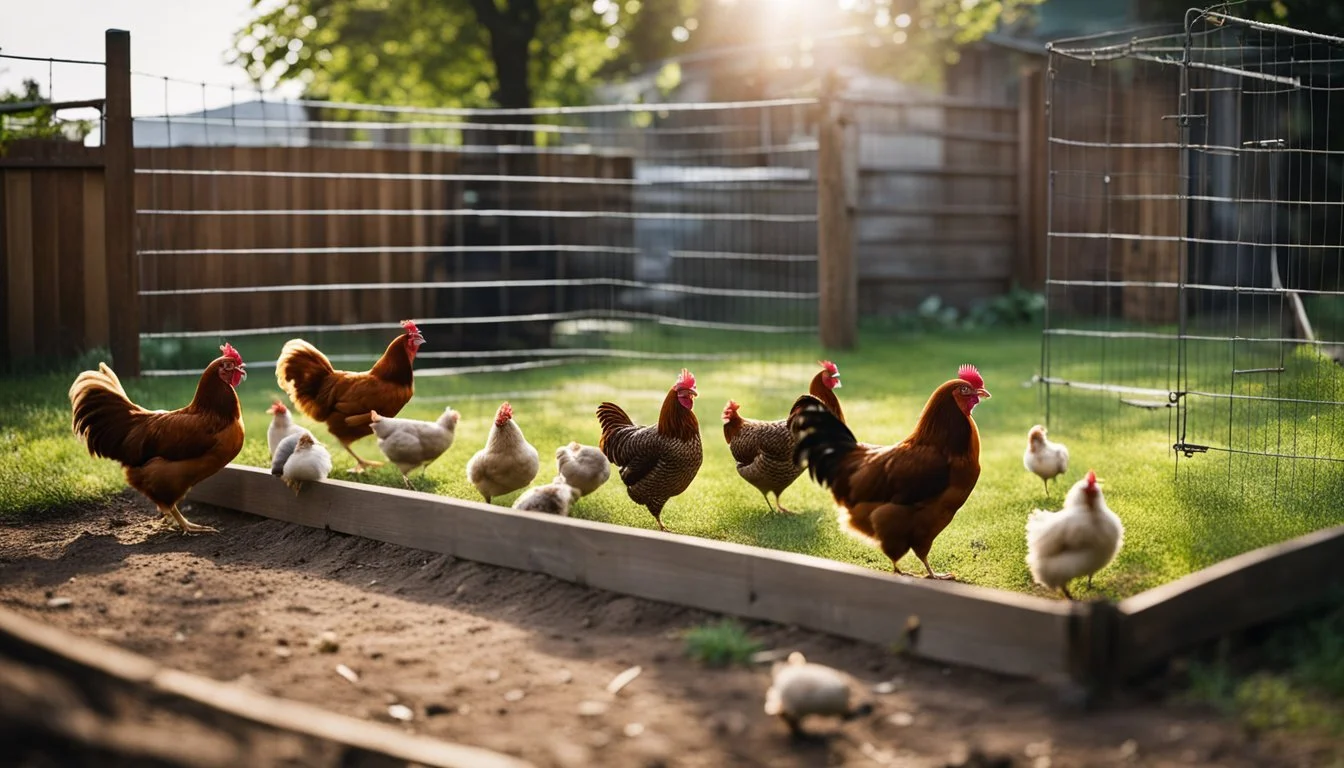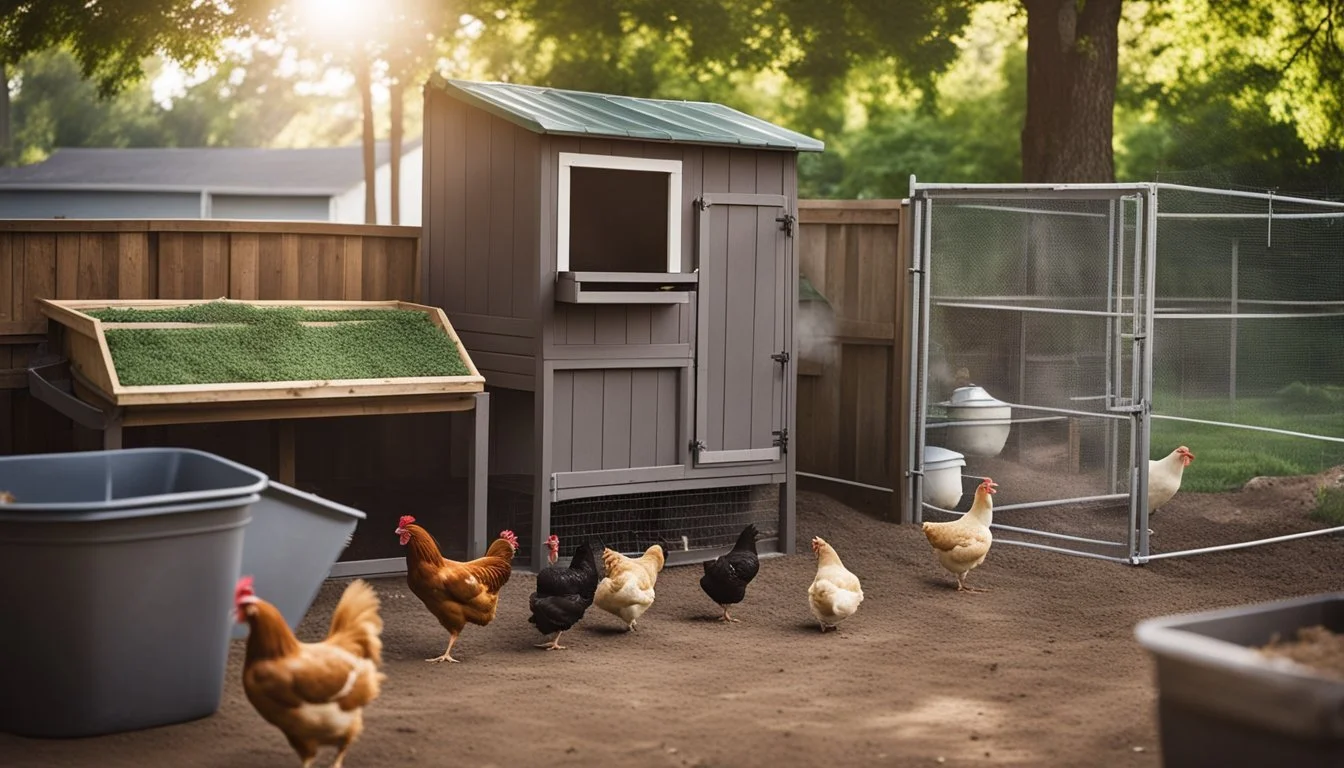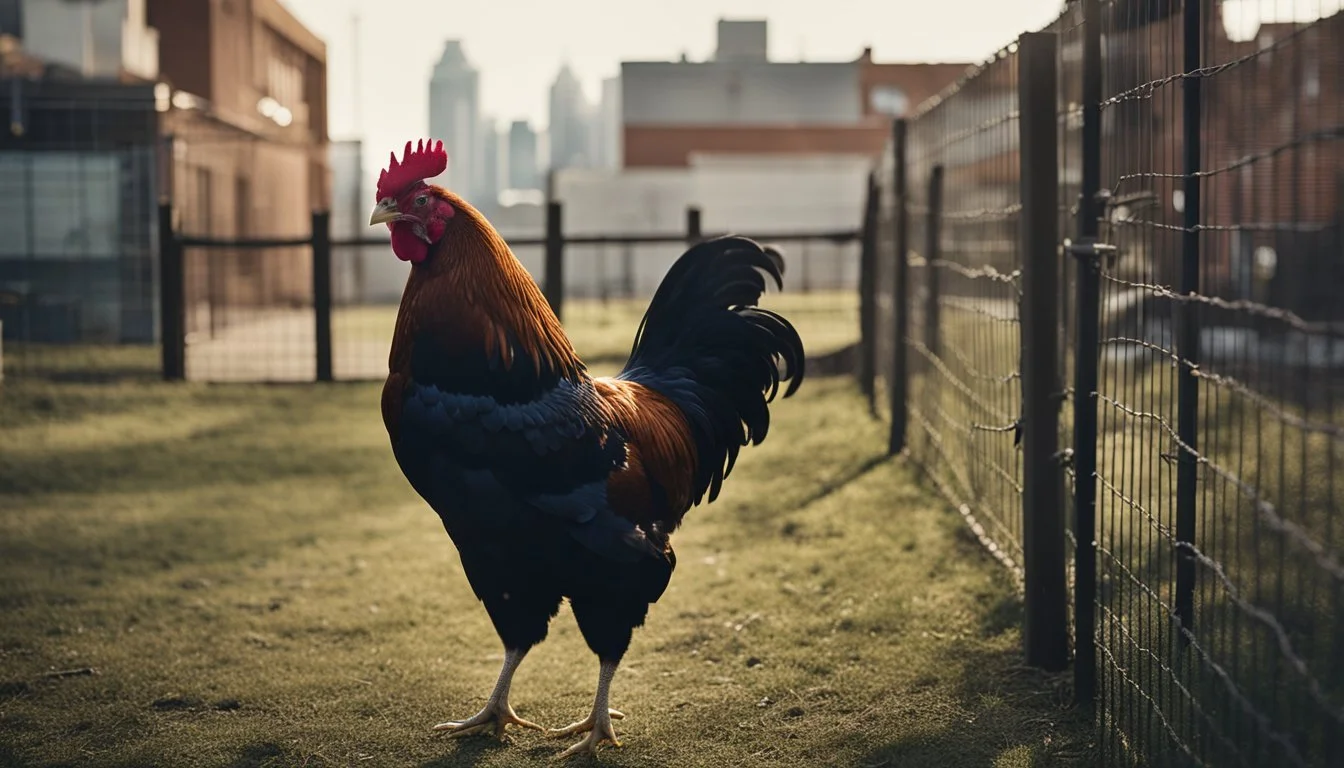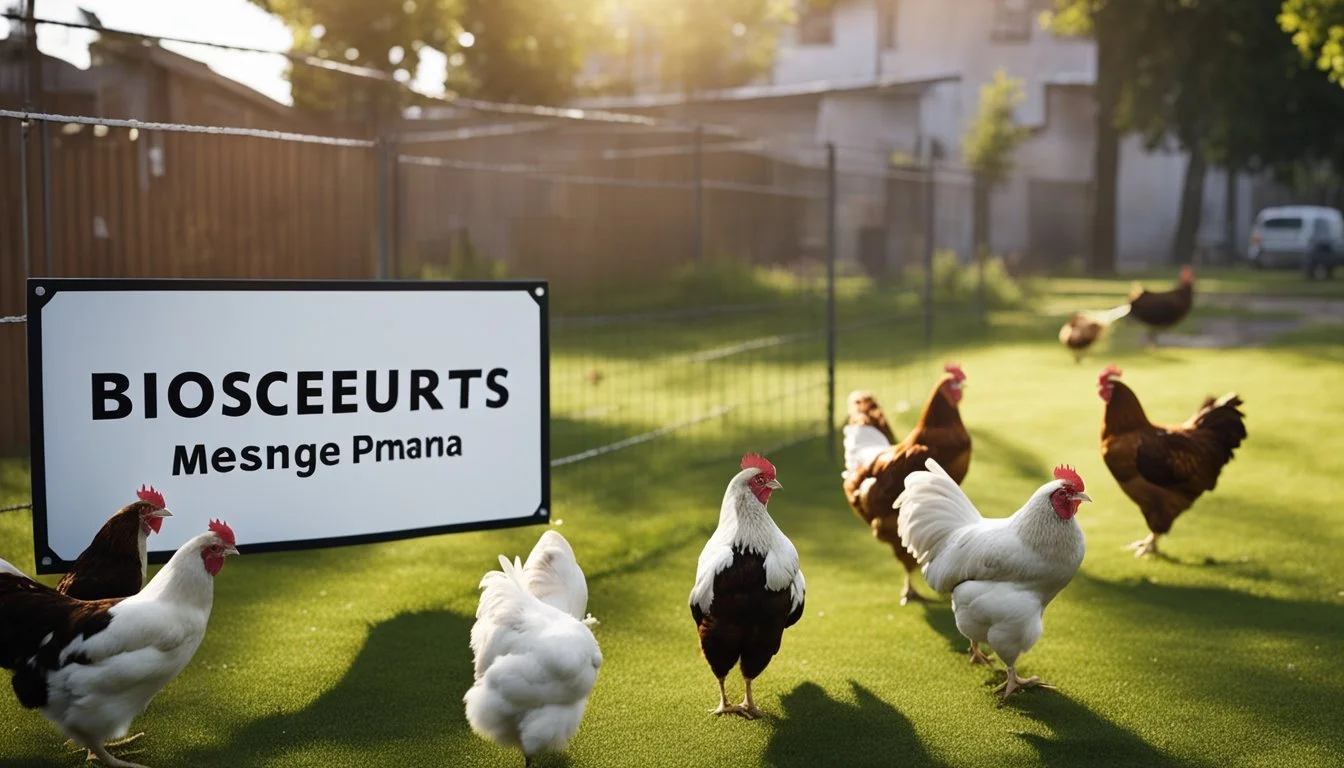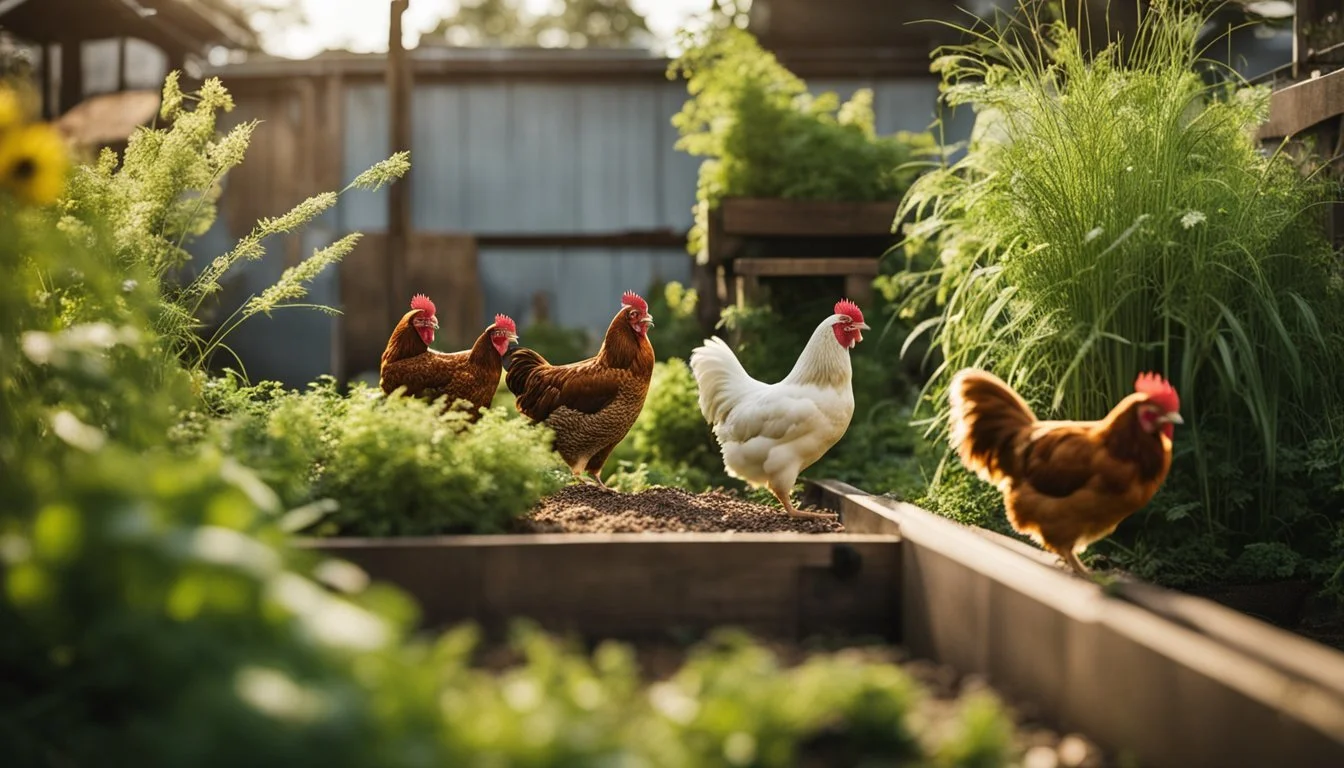7 Tips for Raising Chickens in an Urban Homestead
A Practical Guide
Raising chickens in an urban homestead presents unique challenges and rewards for city dwellers. More people are embracing this trend, finding joy and practicality in harvesting fresh eggs and nurturing a small flock. Combining urban living with chicken keeping can enhance sustainability and provide a closer connection to nature.
Essential tips for successful urban chicken raising focus on maintaining a healthy, safe, and happy environment for the flock. Ensuring that local regulations and space limitations are addressed is crucial for harmonious integration into city life.
1) Provide Proper Housing
Urban chickens need a well-designed coop to thrive. The coop should offer sufficient space, with at least 2-3 square feet per chicken inside and 8-10 square feet in an outdoor run. Space helps prevent overcrowding, which can lead to stress and health issues.
Ventilation is crucial in a chicken coop. Proper airflow reduces moisture and ammonia buildup, keeping the environment healthier. Ensure vents are strategically placed to maintain airflow without creating drafts.
Security is another priority. A sturdy coop protects chickens from urban predators such as raccoons, cats, and dogs. Secure locks and durable materials are essential to prevent break-ins.
Cleanliness in housing is vital. Regular cleaning and maintenance of the coop prevent the accumulation of waste and parasites. Use removable trays or droppings boards to simplify waste removal.
Lighting plays a role in egg production. Chickens need about 14-16 hours of light daily to lay eggs consistently. Natural light through windows and artificial lighting during shorter days can achieve this.
Lastly, include nesting boxes and perches. Each nesting box should be sized appropriately and have bedding material for comfort. Perches allow chickens to roost off the ground, mimicking their natural behavior.
2) Maintain Clean Living Conditions
Ensuring clean living conditions is essential for the health and well-being of urban chickens. A dirty coop can lead to diseases and parasites. Regular cleaning is necessary to prevent these issues.
Daily removal of droppings and soiled bedding is recommended. Fresh bedding should be added frequently to keep the coop dry and odor-free.
Disinfecting the coop and all equipment periodically can help reduce the risk of infections. Use safe, non-toxic disinfectants to protect the chickens.
Ventilation is also crucial. Proper airflow helps to reduce moisture buildup and ammonia levels, providing a healthier environment for the flock.
Regularly check for and remove any pests such as mites or lice. These can cause significant discomfort and health problems for the chickens. Maintaining a clean living space is an ongoing task but is vital for the success of urban chicken keeping.
3) Use High-Quality Feed
Urban chickens thrive on high-quality feed that provides balanced nutrition. Ensuring they receive a diet rich in proteins, grains, vitamins, and minerals is essential for their health.
A pre-mixed, complete poultry feed is an excellent choice. It offers the essential nutrients needed for growth, egg production, and overall vitality. This feed often contains grains, seeds, legumes, and added vitamins.
In addition to commercial feed, they may benefit from fresh vegetables, herbs, and occasional treats. This can include organic herbs like calendula, which can support their immune systems.
Clean, fresh water should always be available. Using feeders and waterers that reduce contamination can help maintain hygiene and prevent potential health issues.
By focusing on high-quality feed and proper nutrition, urban chicken keepers can ensure their flocks remain healthy and productive.
4) Ensure Access to Clean Water
Access to clean water is vital for the health and well-being of urban chickens. Water must be available at all times, as dehydration can quickly lead to health issues. Use sturdy, easy-to-clean containers to minimize contamination.
Regularly check water levels and cleanliness. Refill and clean waterers daily to prevent bacterial growth. Consider placing water sources in shaded areas to keep the water cool and fresh.
Automatic waterers can be an efficient solution, ensuring a consistent supply of clean water. Regularly inspect these systems to ensure they function properly.
In colder months, heated waterers may be necessary to prevent water from freezing. This is crucial to maintain hydration during icy conditions.
Provide multiple water sources if you have a larger flock. This helps prevent competition and ensures every chicken has access to clean water.
5) Monitor for Predators
Urban chicken keepers need to stay vigilant about potential predators. Even in city environments, chickens can fall prey to a variety of animals. Common predators include raccoons, hawks, snakes, and domestic pets like cats and dogs.
Securing the coop with a sturdy lock and durable materials minimizes the risk. Fencing should be high enough to prevent climbing and buried several inches underground to stop digging.
Regularly inspecting the coop and its surroundings for signs of intrusion is essential. Look for holes or loose boards that could offer a way in. Using motion-sensor lights and cameras can also deter nocturnal predators.
It's wise to install a covered run to protect chickens from aerial attacks. Netting or wire mesh can provide an effective barrier against flying predators.
Training pets to coexist safely with chickens prevents accidental harm. Keeping chickens safe requires consistent effort and vigilance. Ensuring the flock's safety is a critical aspect of responsible urban chicken keeping.
6) Implement Biosecurity Measures
Implementing biosecurity measures is crucial for maintaining the health of an urban chicken flock. These measures reduce the risk of disease transmission and keep both chickens and humans safe.
Maintaining clean living conditions is vital. Regularly sanitize coops, feeders, and waterers to minimize bacterial growth. Ensure proper disposal of manure and dead birds to prevent contamination.
Control the movement of animals and people in and out of the chicken area. Limit access to only essential personnel and discourage visitors from handling the birds.
Provide proper nutrition and clean water to boost the chickens’ immune systems. Balanced diets and fresh water play a crucial role in disease prevention.
Vaccination is another key component. Consult with a veterinarian to ensure your flock receives the appropriate vaccines for common poultry diseases.
Adequate ventilation and space are also important. Good airflow reduces the buildup of harmful bacteria and decreases stress levels among the chickens.
Finally, practice consistent handwashing and hygiene after handling chickens. Use dedicated clothing and footwear in the chicken area to prevent bringing in contaminants.
By integrating these steps, urban chicken keepers can effectively reduce the risk of infections and promote a healthy, thriving flock.
7) Regularly Check for Health Issues
Maintaining the health of urban chickens involves regular health checks. Observing chickens closely helps detect early signs of illness. Look for changes in behavior, appetite, and egg production.
Examine the chickens' feathers, eyes, and combs for any signs of parasites or injuries. Healthy birds should have clear eyes, clean nostrils, and smooth, vibrant feathers.
Check their droppings for abnormalities. Distinct signs of health issues include bloody or unusually discolored droppings.
Ensure that they maintain a proper weight and are free from any swelling or unusual lumps. Weigh them periodically to monitor their health accurately.
Keeping the coop clean reduces the risk of diseases. Hygiene is crucial; it helps prevent the spread of infections among the flock.
Incorporate dust baths in their environment. Dust baths help chickens control parasites on their own by suffocating or dislodging them.
Consult with a veterinarian experienced in poultry if any health issues arise. Regular veterinary visits can help manage and prevent serious health problems.
Preparing Your Urban Homestead
Ensuring your urban homestead is ready for chickens requires careful planning. Pay attention to local regulations and choose breeds that thrive in city environments.
Local Regulations and Permits
Before starting, check local municipal laws and Homeowners Association (HOA) rules. Many cities have specific ordinances that outline the number of chickens allowed, restrictions on roosters, and coop requirements. Violating these could lead to fines or mandatory removal of your flock.
Visit your city’s official website or local government offices to obtain necessary permits. This process might also involve notifying neighbors and ensuring your coop design meets building codes.
Being informed about regulations ensures you can raise chickens peacefully and legally, avoiding potential conflicts with neighbors or authorities.
Selecting the Right Breed for Urban Settings
Choosing the right chicken breed is crucial for urban environments. Breeds like Bantams, Orpingtons, and Silkies are known for their calm temperament, making them ideal for city living. They are generally quieter and smaller, requiring less space and being less likely to disturb neighbors.
Consider your climate when selecting a breed. Some chickens are better suited to warm climates, while others thrive in cooler weather. It's also important to choose breeds that are good layers if egg production is a priority.
Consult with local breeders or agricultural extensions to find breeds that are well-suited to urban living and meet your specific needs.
Building and Maintaining a Coop
A successful urban chicken coop requires careful design to prevent predators and diligent maintenance to ensure cleanliness and health.
Designing a Predator-Proof Coop
Protection from predators is critical. Install sturdy fencing around the coop and run, burying it a few inches into the ground to prevent animals from digging under. Use durable materials like hardware cloth instead of chicken wire, as it is stronger and less likely to be breached by predators.
Secure latches on doors and windows are essential. Ensure all entry points are well-secured with predator-proof latches. Regularly inspect the structural integrity of the coop to identify and address potential vulnerabilities.
Elevate the coop slightly off the ground if possible to prevent rodents and other small animals from nesting beneath it. Additionally, incorporating motion-activated lights or alarms can further deter nocturnal predators.
Coop Hygiene and Maintenance
Cleanliness is vital for the health of your chickens. Remove old bedding, droppings, and feathers frequently. Scrub down walls, floors, and nesting boxes with a non-toxic cleaner to eliminate bacteria and parasites.
Bedding should be changed often to maintain a dry and comfortable environment. Consider using straw, wood shavings, or other absorbent materials.
Ventilation is crucial. Ensure the coop has adequate airflow to prevent moisture buildup and ammonia odors. Proper ventilation helps in keeping the coop dry and reducing respiratory issues in chickens.
Routine checks are important. Regularly inspect the coop for signs of disrepair or infestations. Addressing minor issues promptly will prevent larger problems and maintain a safe and healthy living environment for your chickens.
Feeding and Nutrition
Proper feeding and nutrition are critical to the health and productivity of urban chickens. This includes selecting high-quality commercial feed and supplementing it with nutritious treats to balance their diet.
Choosing the Best Feed
Different types of feed are available for chickens at various life stages. Starter feed is appropriate for chicks, while grower feed suits young chickens. Layer feed, optimized for egg production, is ideal for adult hens and contains around 16-18% protein.
Poultry feed ingredients typically include grains, such as corn and soybeans, along with essential vitamins and minerals to support the health of the flock. Calcium is a crucial component for laying hens, contributing to stronger eggshells.
Chickens should have constant access to fresh water, as hydration is vital for their metabolism and egg production. Place waterers at a convenient height to prevent contamination.
Supplements and Treats
Adding organic herbs to the diet can enhance overall health. Herbs such as oregano, thyme, and garlic can act as natural antibiotics and immune boosters.
In addition to balanced feed, treat chickens with kitchen scraps, grains, and seeds. However, treats should not exceed 10% of their diet to avoid imbalances. Known high-calcium treats include crushed eggshells and oyster shells.
Environmental enrichment is also essential. Scatter feed to encourage natural foraging behaviors and add variety to their diet. Avoid offering harmful foods such as chocolate, onions, and salty snacks.
Using a mix of quality feed and healthy supplements can ensure urban chickens thrive, laying nutritious eggs and remaining healthy.

